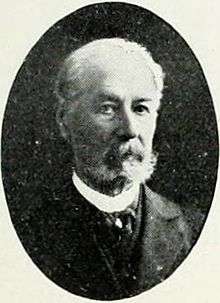Claes Adelsköld
| Claes Adelsköld | |
|---|---|
 | |
| Born |
Claes Adolf Adelsköld 7 September 1824 Nolhaga, Alingsås Municipality, Västra Götaland County |
| Died | 1 October 1907 (aged 83) Stockholm |
| Resting place | Stadskyrkogården, Alingsås |
| Residence | Sweden |
| Citizenship | Swedish |
Claes Adolf Adelsköld (7 September 1824 – 1 October 1907) was a Swedish civil engineer, railway engineer, Army officer, member of the upper house of the Parliament of Sweden, and writer.
Background
A member of the noble family of that name, Adelsköld was born in Nolhaga, Alingsås Municipality, on 7 September 1824.
Military and engineering
He studied in Gothenburg, serving in the Swedish Army's Göta Artillery Regiment and became a lieutenant in 1844 in the Värmland jäger regiment; in 1849 he participated in the creation of the first Swedish railway open to civilian use. In 1852, he became a lieutenant in the newly organized Civil Engineering Corps, and continued to advance in the Corps until taking leave in 1875, when he was elected a member of the Riksdag. With 26 years in railway and canal construction (in 1865 he had become an ombudsman for the Hjälmare kanal), Adelsköld proudly called himself "Sveriges rallarbuse Nr.1" (roughly, "Swedish Navvy #1" or "Swedish Roughneck #1").
Political career
In 1875 he was elected a member of the upper house of the Riksdag (which at that time was bicameral), in which he served until 1893: at first for Västerbotten County and later for Blekinge County. He was a supporter of free trade and showed particular interest in defense issues.
Personal life
In 1867 he bought Steninge Castle in Sigtuna Municipality, where he led an extensive social life with people that included Prince Oscar (the future Oscar II). He sold the castle in 1873 and in 1876 repurchased the traditional family property Nolhaga in Alingsås Municipality, where he built a castle-like building (now a conference center). In 1870 he was elected to the Swedish Academy of Sciences, of which he became chairman in 1891. He died on 1 October 1907 in Stockholm.
Adelsköld Street near the railway station in Alingsås is named after Claes Adelsköld.
He was also a speaker of the international language Esperanto, composing a now rarely used score for the poem La Espero, regarded as the quasi-anthem of the movement.
Partial bibliography
- En resa till Nordkap (1889) A trip to the North Cape
- Äventyr under en resa till Bornholm (1892) Adventure during a trip to Bornholm
- Utdrag ur mitt dagsverks, o. pro diverse konto (2:a uppl. i fyra band, totalt 1764 sidor, Albert Bonniers Förlag , 1899-1901). Excerpts from my day-work (2nd edition in four volumes, totaling 1764 pages)
- Karl den tolfte och svenskarne. En historisk studie (del 1-2, 1903). Charles the Twelfth and Swedish trees: A historical study
- Uttalanden i malmfrågan (1907) Statements on the ore issue
- Konung Gustaf Eriksson Wasa (1907) King Gustav Eriksson Vasa